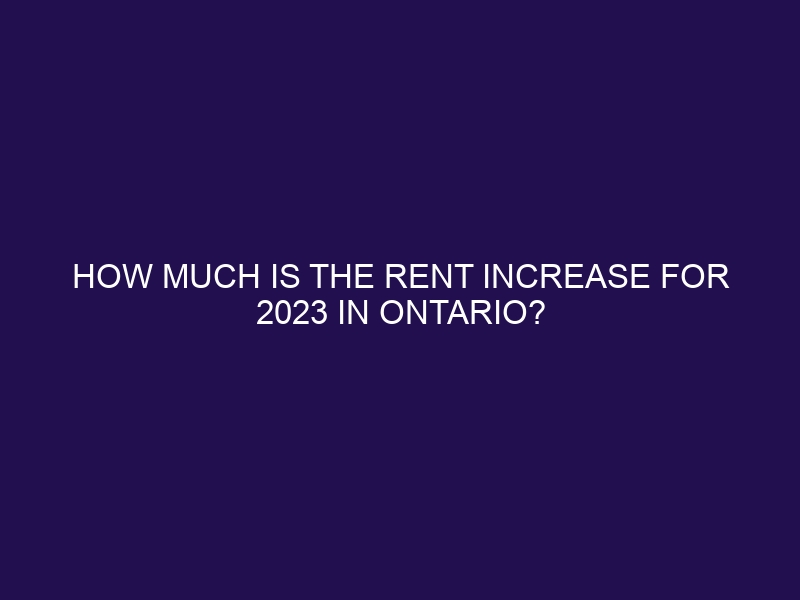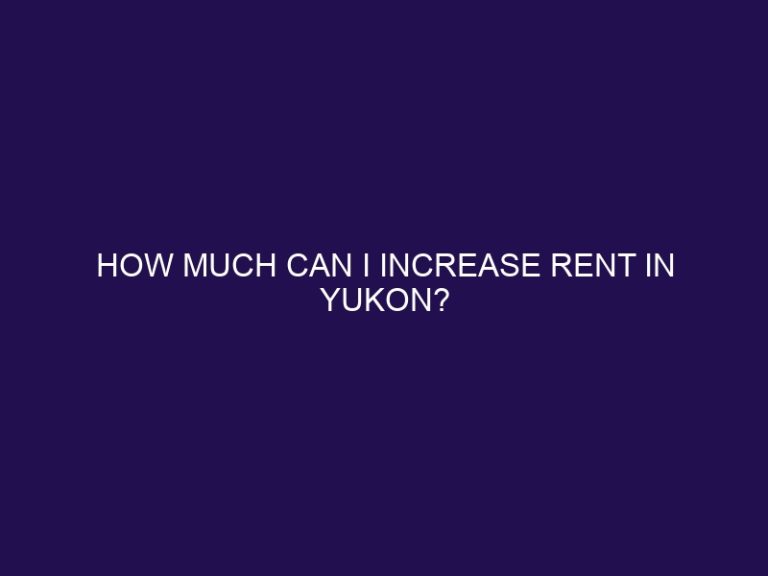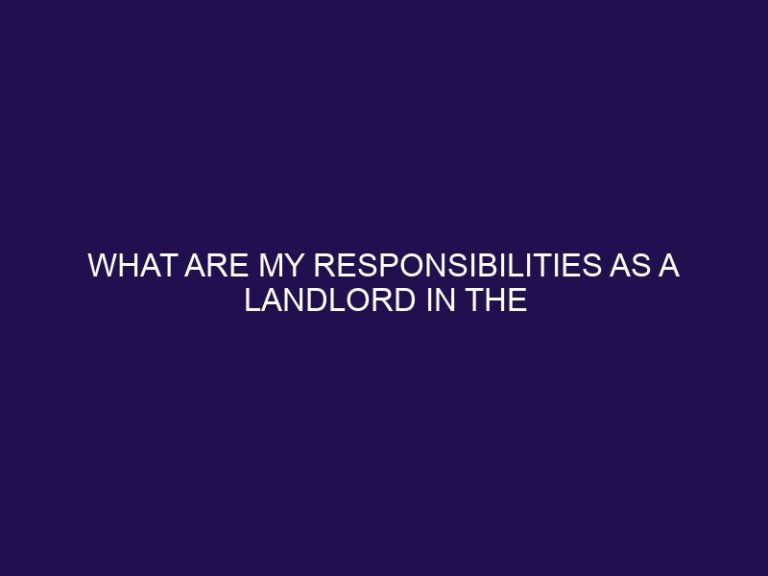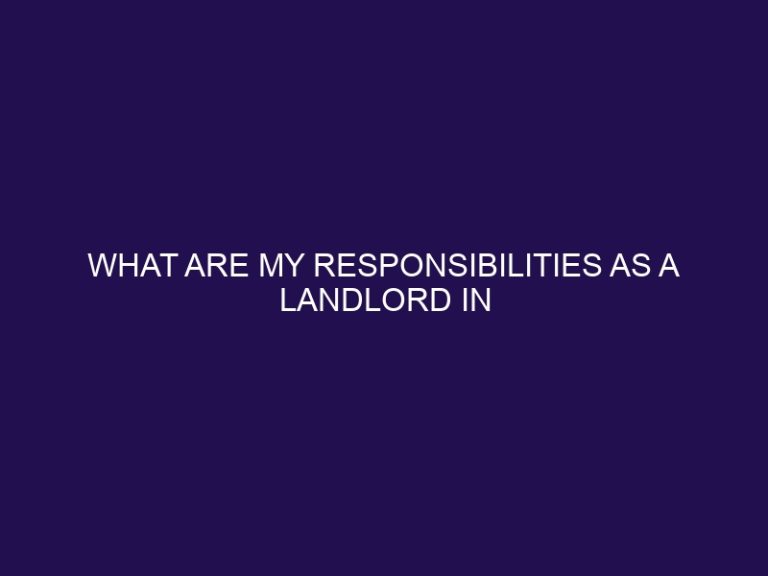How much is the rent increase for 2023 in Ontario?
.jpg)
In Ontario, the rent increase for 2023 is a topic of interest and concern for both tenants and landlords. Understanding the rules and guidelines regarding rent increase is crucial for both parties to ensure a fair and transparent process.
The Rent Increase Guideline is a policy set by the government of Ontario that outlines the maximum allowable increase for rental units in a given year. The guideline helps protect tenants from excessive rent hikes while allowing landlords to recover reasonable costs.
To calculate the Rent Increase Guideline, the government considers factors such as inflation rates, economic conditions, and the Consumer Price Index. This calculation ensures that the increase is reasonable and reflects the current market.
For the year 2023, knowing the specific rules for rent increases in Ontario is essential. It is important to note that as of now, there is no rent freeze in place for 2023, meaning landlords can increase rents within the allowable limits.
The maximum allowable rent increase for 2023 in Ontario is set at 2.5%, as determined by the Rent Increase Guideline. However, there may be exemptions to this guideline for certain rental units and circumstances.
Landlords must follow specific steps when implementing a rent increase. These steps include providing tenants with proper notice and adhering to specific timelines. The notice required for a rent increase and the advance notice given to tenants must comply with provincial regulations.
If tenants disagree with a rent increase, they have options to address their concerns. They can communicate with their landlord or seek guidance from relevant authorities to resolve any disputes or negotiate a fair resolution.
Understanding the rules and regulations surrounding rent increases is crucial for both tenants and landlords to foster a harmonious living environment and ensure fairness in the rental market. By staying informed about the process, tenants and landlords can navigate their rights and responsibilities with confidence.
Key Takeaways:
- The Rent Increase Guideline determines the maximum allowable rent increase for 2023 in Ontario.
- There is no rent freeze in Ontario for 2023, meaning landlords can increase rent within the guidelines.
- Landlords must follow specific steps and provide notice to tenants when implementing a rent increase.
What is the Rent Increase Guideline?
The Rent Increase Guideline refers to a regulation in Ontario that governs the maximum amount landlords can raise the rent for residential properties. This guideline is determined annually by the government and is based on the Ontario Consumer Price Index. In the year 2023, the rent increase guideline stands at 2.5%. This means that eligible properties can experience up to a 2.5% increase in rent throughout the year. Understanding and abiding by this guideline is crucial for both landlords and tenants to ensure that rent adjustments are fair and legal.
As someone who recently rented an apartment in Ontario, I experienced immense relief when I discovered that my landlord followed the Rent Increase Guideline. This not only provided me with peace of mind regarding the affordability of my rent but also contributed to nurturing a positive relationship between me and my landlord. The guideline served as a fair and transparent benchmark, enabling me to plan my budget effectively and anticipate any potential rent hikes. I truly appreciate the government’s implementation of this regulation as it safeguards tenants and ensures that rent increases remain reasonable and manageable.
How is the Rent Increase Guideline Calculated?
The rent increase guideline in Ontario is calculated based on the annual percentage change in the Consumer Price Index (CPI), which measures inflation. How is the Rent Increase Guideline Calculated? The guideline is determined by the Province of Ontario and is set at a maximum percentage for each year. For 2023, the rent increase guideline is 1.2%. Landlords are legally required to follow this guideline when increasing the rent for their tenants. It is important for landlords to calculate the rent increase accurately by using the current guideline percentage and applying it to the current rent amount. By adhering to the rent increase guideline, landlords can ensure fair and reasonable rent increases for their tenants.
What are the Rules for Rent Increases in Ontario for 2023?
In Ontario for 2023, what are the rules for rent increases? Here are the key points to consider:
– The maximum allowable rent increase for most residential properties is 1.2%.
– Landlords must provide written notice of the rent increase at least 90 days before it takes effect.
– Tenants have the right to dispute a rent increase within 30 days and can apply for a hearing at the Landlord and Tenant Board.
– Some rental units, such as those built after 2018, may have different rules for rent increases.
– Rent increases cannot be implemented for reasons unrelated to the cost of maintaining the property.
Is There a Rent Freeze in Ontario for 2023?
No, there is no rent freeze in Ontario for 2023. Is There a Rent Freeze in Ontario for 2023? The Rent Increase Guideline sets the maximum allowable rent increase for the year based on the Consumer Price Index. Landlords must follow specific rules and provide proper notice when increasing rent. If tenants disagree with a rent increase, they have the option to discuss it with their landlord or file an application with the Landlord and Tenant Board. While there may not be a rent freeze, tenants still have rights and recourse if they feel a rent increase is unjustified or unreasonable.
What is the Maximum Allowable Rent Increase for 2023?
The maximum allowable rent increase for 2023 in Ontario is set at 2.5%. What is the Maximum Allowable Rent Increase for 2023? This percentage is regulated by the government to protect tenants from excessive rent hikes. Landlords are required to provide proper notice to their tenants before increasing the rent, and the increase cannot exceed the annual guideline. It is important for tenants to be aware of their rights and responsibilities when it comes to rent increases and to consult the Residential Tenancies Act for more information on the specific regulations and guidelines in Ontario.
Are There Any Exemptions to the Rent Increase Guideline?
Are There Any Exemptions to the Rent Increase Guideline?
In Ontario, there are exceptions to the rent increase guideline. As per the regulations for rent increases in Ontario in 2023, landlords have the option to request an above-guideline increase (AGI) if they have experienced substantial expenses related to capital investments, repairs, or renovations in the rental property. Landlords are required to adhere to specific procedures and obtain approval from the Landlord and Tenant Board before implementing an AGI. It is crucial for landlords to provide tenants with appropriate notice and documentation when seeking an exemption to the rent increase guideline.
What are the Steps Landlords Must Follow for a Rent Increase?
- In order to legally increase rent in Ontario, landlords must follow specific steps to ensure the process is fair and transparent. What are the Steps Landlords Must Follow for a Rent Increase?
- Check the lease agreement: Review the lease to confirm if there are any limitations or restrictions on rent increases.
- Provide notice: Give the tenant at least 90 days written notice before the rent increase takes effect.
- Calculate the maximum increase: Determine the maximum percentage increase allowed by the Ontario government for the specific year.
- Deliver the notice: Provide the rent increase notice in writing, clearly stating the new rent amount and the effective date.
- File with the Landlord and Tenant Board: If the tenant objects to the increase, the landlord may need to apply for a hearing with the Landlord and Tenant Board.
Remember to always be respectful and open to discussing any concerns or questions the tenant may have about the rent increase. Good communication is key to maintaining a positive landlord-tenant relationship.
What Notice is Required for a Rent Increase?
What Notice is Required for a Rent Increase?
When it comes to rent increases in Ontario, landlords are required to provide tenants with proper notice. According to the rules, landlords must give at least 90 days’ written notice before implementing a rent increase. This notice must clearly state the new rental amount and the effective date of the increase. It is essential for landlords to adhere to these guidelines to ensure a smooth and legal process. By providing tenants with the required notice, landlords can maintain transparency and allow tenants ample time to adjust their budgets accordingly.
How Much Advance Notice Must Landlords Give Tenants?
Landlords in Ontario must provide their tenants with proper advance notice when increasing the rent. How Much Advance Notice Must Landlords Give Tenants? The required notice period depends on the type of lease agreement in place. For a monthly lease, landlords must provide at least 90 days’ written notice before the rent increase takes effect. For a yearly lease or a lease longer than a year, landlords must provide at least 90 days’ notice before the end of the lease term. Failure to provide the appropriate notice may result in an invalid rent increase. It is important for landlords to understand and adhere to these notice requirements to maintain a positive landlord-tenant relationship.
What can Tenants do if they Disagree with a Rent Increase?
- If tenants in Ontario disagree with a rent increase, there are steps they can take to address the issue.
- Review the lease agreement to understand the terms and conditions set by the landlord.
- Consult the Landlord and Tenant Board (LTB) website or legal resources for information on rights and procedures.
- Communicate with the landlord to negotiate a fair resolution or propose a lower rent increase.
- If no resolution is reached, tenants can file a dispute with the LTB and attend a hearing to present their case.
- During this process, tenants should gather evidence, such as communication records and supporting documents.
Some Facts About Rent Increase for 2023 in Ontario:
- ✅ Rent control in Ontario applies to rental units occupied before November 15, 2018. (Source: Our Team)
- ✅ The 2023 rent increase guideline provided by the Ontario government is the maximum amount landlords can increase rents in 2023. (Source: Our Team)
- ✅ Landlords must give tenants at least 90 days notice before the date of the rent increase. (Source: Our Team)
- ✅ The N1 Notice of Rent Increase Form must be used to give notice. (Source: Our Team)
- ✅ Rent can only be increased if at least 12 months have passed since the last increase or since a new tenant moved in. (Source: Our Team)
Frequently Asked Questions
1. How much can Ontario landlords increase rent in 2023?
According to the 2023 rent increase guideline set by the Ontario government, landlords can increase rent up to the maximum amount specified.
2. Can rent be increased more than the guideline in 2023?
Yes, with approval from the Residential Tenancies Act, 2006, landlords can increase rent more than the guideline amount in 2023 under extenuating circumstances.
3. Are units occupied after November 15, 2018 subject to rent control in 2023?
No, units occupied after November 15, 2018 are not subject to rent control in 2023.
4. How much notice is required for a rent increase in 2023?
Landlords must provide tenants with at least 90 days notice before the date of the rent increase in 2023.
5. Can landlords increase rent more than once a year in 2023?
No, landlords are limited to increasing rent once a year in 2023, subject to the requirements of the Residential Tenancies Act, 2006.
6. Can landlords of newer units increase rent above 2.5% in 2023?
Yes, landlords of newer units can apply to the Landlord and Tenant Board for increases above 2.5% in 2023, after providing tenants with a written notice at least 90 days in advance.







